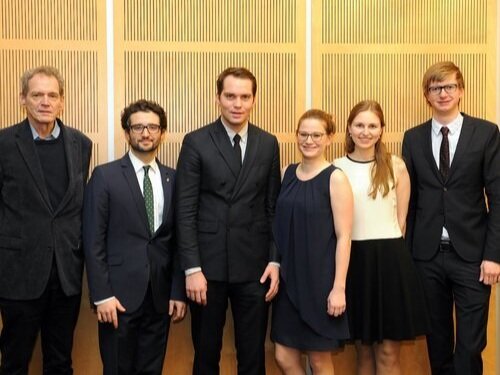Obermayer German Jewish History Award
Carla and Erika Pick
Borken, Northrhine-Westfalia
Carla and Erika Pick work with the precision of German bureaucrats, but they radiate the warmth of a pair of favorite aunts. At 75, the twins are the oldest members of the Arbeitskreis (the Committee for Jewish Life in Gemen and Borken); they are also the engine that helps the group run.
On behalf of the Arbeitskreis, the Picks invite ex-Borken Jews to visit the town’s schools, where they talk about their experiences in Nazi Germany and about Jewish life and culture. The sisters, who taught at the same school for 12 years, keep in contact with survivors through frequent letters and greeting cards. They have also built an extensive archive of interviews, family photos and stories. “They move heaven and hell just to find out details,” says committee member Mechthild Schoeneberg. “They bring to light unbelievable things.”
The twins may push the engine along, but they are part of a five-person team. Social scientist Schoeneberg, 42, and historian Thomas Ridder, 44, contribute in-depth knowledge to the Arbeitskreis and do most of the archival research. Maria Wolters-Hoeyng, a 56-year-old business executive, is in contact with banks and businesses. She is responsible for fund-raising and organizing. In 1988, Schoeneberg, who had been active in local politics, was asked to organize an exhibition for the 50th anniversary of Kristallnacht. Erika and Carla Pick joined the 12-person committee working on the event. Until then, the retired teachers were just known for a puppet collection they had in the town museum. “Originally, we thought we might do the writing work, summaries and such things,” Erika says. Carla adds: “During Nazi times, we were pretty young, but we thought we could talk about what we remembered as contemporary witnesses.”
More than 10,000 visitors ultimately saw the exhibition, which goes back to the 14th century. Five committee members decided to continue the work and now make up the Arbeitskreis. “We thought: ‘If we stop now, all of our research will be lost again,’ ” Ridder says.
Since then, the group has added a guide to the exhibition, titled “The Life and Fate of the Jews in Borken.” The members have developed a program for local schools that teaches about Jewish history, culture and religion through a workbook and a suitcase with ceremonial artifacts. And at least once a year, survivors come to the schools to tell their stories.
“It is much more vivid if somebody recounts how he was forced by the [Nazis] to stand on the street in his sleeping clothes, trembling from the cold, rather than just explaining during Kristallnacht that there were attacks on Jews,” Ridder says.
Ex-Borkener Gershon Kaddar has traveled from Israel to speak. “After World War II, I felt that I had settled my accounts with the Germans, and I had no desire to even visit,” he says. “The Arbeitskreis had a serious impact on Borken and on the capability of our families to reconnect to our historic background.”
The committee as a whole is today concentrating on maintaining contact with survivors and collecting information about their families. It is unclear what will happen when the last of the contemporary witnesses can no longer return, however. The survivors are getting older; only five have been able to come back in recent years. But the Pick sisters—and the rest of the Arbeitskreis— are collecting ideas to continue the exchange with descendants.
THIS WALL BRINGS PEOPLE TOGETHER
Students at this Berlin elementary school, built on the site of a synagogue, have been building a wall for the past two decades. It delivers a powerful message about community.
STUDENTS REACHING STUDENTS
When a handful of ninth graders from Berlin met Rolf Joseph in 2003, they were inspired by his harrowing tales of surviving the Holocaust. So inspired that they wrote a popular book about his life. Today the Joseph Group helps students educate each other on Jewish history.
“I SPEAK FOR THOSE WHO CANNOT SPEAK”
Margot Friedländer’s autobiography details her struggles as a Jew hiding in Berlin during World War II. Now 96, she speaks powerfully about the events that shaped her life and their relevance today.



